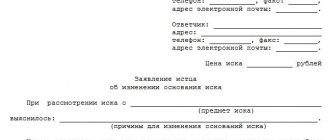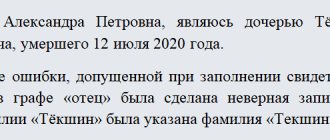Each participant in the trial has certain rights and obligations. One of the rights of the defendant is the right to have the claim recognized. When a statement of claim being considered in court is fully admitted by the defendant, the court does not need to consider the circumstances of the case in detail; it can make a positive decision only on the confession of the defendant. In a civil case, such testimony is called an admission of claim, and if in a criminal trial the accused admits his guilt, this is called consideration of the case in a special manner; these cases give the court the right to make a positive decision in favor of the plaintiff.
You will learn more about how exactly the recognition of a claim occurs, what it is, and what the consequences of these actions are in the published article.
What it is?
Acknowledgment of the claim represents the defendant's agreement with the demands made by the plaintiff in the lawsuit. In this case, there are two types of recognition of a claim:
- Full;
- Partial.
But, in any case, if a person admits the claim, the court will satisfy it, but whether it completely depends on what the defendant admitted and what was established during the trial. Since the defendant can give his consent at any stage of the consideration of the case, it may already be partially considered by the court, and something may be established during the trial. Further establishment of circumstances loses its meaning after the defendant agrees to the requirements, thereby speeding up the trial process and simplifying the work of judges.
Info
The defendant's admission of the claim may not be accepted by the court if it violates the law. The confession must be given voluntarily, the defendant must be warned of the consequences of agreeing to the demands of the claim, and the defendant must list all the demands of the claim with which he agrees. The defendant must list whether he agrees with the circumstances presented by the plaintiff in the claim, and also object if he does not agree with some of them.
At what stage can claims be recognized?
The plaintiff's claims may be accepted by the defendant until the judge leaves for the deliberation room. Once the resolution is announced in the courtroom, recognition of the demands becomes useless. The decision has already been made, and if the claims are recognized as justified, the defendant is obliged to fulfill the plaintiff’s demands automatically, regardless of his own desire.
Procedure
In order for a positive decision to be made in favor of the plaintiff, when the defendant agrees with the requirements, the defendant must draw up an application to the court for recognition of the claim. When it is filed in court, it is considered that there has been a full acceptance of the claim by the defendant. Of course, in order for the defendant’s statement to be accepted, it is necessary that the court considers that it does not contradict the law, does not violate anyone’s rights, and was written by the defendant voluntarily.
After the court accepted the defendant's application. He terminates the trial and proceeds to rule on the claim in favor of the plaintiff. After the application for recognition of the claim is accepted, the court stops considering evidence in the case. The defendant may make a confession at any time during the consideration of the claim by the court.
Info
The fact that consent to the claim has been received from the defendant is recorded in the court record, and the statement is attached to the materials of the case.
In order for the court to understand whether the statement of recognition of the claims was drawn up voluntarily, the judge interviews the defendant. In the interview, the judge must find out and check the following factors:
- The reasons why the defendant admitted the claim;
- Are there any conditions for recognizing a claim;
- Are there any circumstances that forced the defendant to do this;
- Does he have diseases due to which he does not understand the meaning of these actions;
- Does the defendant understand the content of the claims and the consequences of the confession?
If it turns out that the defendant is being forced to admit the claim, then such admission will not be accepted, and the case will be considered in the usual manner. The record must record all questions and answers asked by the judge to and received from the defendant.
Attention
A settlement agreement may be concluded between the parties if the plaintiff agrees with the defendant’s recognition of the claim under the conditions, but in the case of voluntary fulfillment of the requirements under these conditions. If there are several defendants in a case, one of them agrees with the claim that violates the rights of others, so the case will be considered in the usual manner.
Grounds for filing a claim
The main reasons for refusal to issue an inheritance certificate:
- Missing deadlines for submitting documents.
- Lack of evidence of relationship with the deceased citizen.
- Lack of evidence of actual acceptance of property.
- The documents provided indicate the completion of legal actions after six months.
- Lack of documents confirming the testator’s rights to property discovered after his death. Similar situations are quite common among village residents. Property passes from generation to generation. While the documents remain unformed. Sometimes it happens that a person started building a house, but did not have time to finish it or draw up the relevant documents. A similar rule applies to non-privatized housing. Provided that the tenant has begun the privatization procedure.
- Presence of controversial situations. For example, there are other claimants to the property or a court hearing has begun to challenge the will.
- Other reasons.
Expert opinion
Stanislav Evseev
Lawyer. Experience 12 years. Specialization: civil, family, inheritance law.
Each of the presented grounds excludes the possibility of obtaining a certificate and subsequent registration of property rights. In some cases there is no point in going to court. For example, if there is a hearing to challenge the order. If we are talking about a lack of individual documents or evidence, then the heir should file a claim for recognition of ownership.
Sample
Applications to the court for recognition by the defendant of a claim in a civil case can be obtained on the Internet or obtained from the court office. And on our website below you can find a statement drawn up by lawyers taking into account the latest changes in current legislation. There is no specific application form established by law, so you can use this form.
The header of the application indicates where and from whom it is sent. In the center of the document its title is indicated: “STATEMENT on the recognition of the claim by the defendant,” and then information about the case and the parties to the claim that are participating in the proceedings, the reasons for the recognition of the claims and an indication of the specific requirements and their scope with which the defendant agrees is indicated.
Then the legal grounds relied upon by the defendant in admitting the claim are indicated, and he agrees that he is aware of the consequences of the actions of accepting the claim, and he is ready to accept them. At the end of the application, the date of preparation and the signature of the defendant are indicated.
Download
Sample application.doc
Sample
In _________________________ (name of court) Defendant: ___________________ (full name, address)
Application for recognition of the claim by the defendant
The court is considering a case on the claim of _________ (full name of the plaintiff) against _________ (full name of the defendant) for _________ (indicate what the plaintiff demands).
Due to the fact that the plaintiff’s demands are justified, I recognize the claims in full.
The provisions of Articles 35, 39, 173 of the Civil Procedure Code of the Russian Federation that the court accepts recognition of the claim when this recognition does not contradict the law, does not violate the rights and legitimate interests of other persons, that when the court accepts recognition of the claim, the court makes a decision to satisfy claims, I am aware of.
Date of application: “___”_________ ____ Signature _______
Classification of claims based on material and legal grounds
Classification of claims according to substantive grounds (corresponds to the branch of law):
- labor;
- housing;
- civil;
- family, etc.
Civil claims (claims from civil legal relations) are divided into:
- claims from individual agreements (from a lease agreement, leasing agreement, etc.);
- claims for protection of property rights;
- claims for inheritance rights;
- copyright claims.
The substantive classification of claims allows us to determine:
- direction and scope of judicial protection;
- jurisdiction of the dispute and its subject composition;
- identify the specific procedural features of this dispute.
Consequences
At the end of questioning the defendant in court after filing an application for recognition of the claim, the judge must explain to him the consequences of the actions taken. The defendant's understanding of the consequences is then recorded in the court record. The judge informs the defendant of the following consequences of agreeing to the claim:
- Satisfaction of claims with which the defendant agrees;
- Lack of opportunity to appeal the decision;
- The court decision will record that the citizen admitted the claim.
Moreover, if a citizen agrees with only part of the circumstances and claims specified in the claim by the plaintiff, he must convey this idea to the court. After all, the defendant can adhere to his legal qualification of the facts and insist on the application of a different law than the one required by the plaintiff. If the defendant admits the claim in full, he will no longer be able to demand that the claims be changed, so you need to think about this in advance.
General provisions on the procedure
Consent to the claims is an application intended for the court by the accused party. The purpose of such an appeal is the desire to reach a compromise with the plaintiff.
Submitting a petition is permitted both in writing and orally. Moreover, you can show your will at any stage of the process.
The key principle for recognizing claims is the voluntary decision of the responsible party. Any action that forces the defendant to write a statement against his will is illegal.
The demands presented can be admitted in full (undisputed recognition - absolute agreement with the facts provided by the prosecution) or partially.
Note! Recognition by content is:
- Complete – agreement with all facts and claims of the opposing party;
- Partial – the participant in the proceedings agrees to part of the requirements
- Simple – agreement with all stated claims.
- Qualified – recognition with reservations challenging the absolute fairness and legality of the claims.
Acknowledgment of the circumstances of the case is not regarded as agreement with the claims. For example, a party may agree that an exchange transaction has been completed, but deny the need to make an additional payment.
Responsibilities of the Judiciary
The secretary records in the minutes:
- the plaintiff's request to waive the claims;
- agreement with the requirements expressed by the second participant or his principal;
- conditions for signing a settlement agreement.
When filing an application for recognition of claims or intention to sign a settlement agreement, these documents are attached to the protocol.
The judge is obliged to explain the consequences of admitting the claims to the participant in the proceedings. If the explanations are clear, the defendant signs the protocol. If the judge fails to follow this procedure, the verdict may subsequently be challenged.
Attention! Our qualified lawyers will assist you free of charge and around the clock on any issues. Find out more here.
Grounds for non-acceptance of a document
Please note! The court has the right to refuse to accept a petition for recognition of a claim if the following circumstances exist:
- this action will affect the interests of third parties and violate the law;
- the decision was made due to fraud or threat;
- the circumstances of the case are deliberately hidden;
- the case will not be automatically dismissed if the parents divorce because the interests of the children are affected.
If there is reason to believe that the law or the prerogatives of interested parties has been violated, the defendant will have to challenge the validity of such grounds.
Registration of partial recognition
Current legislation does not contain specific requirements for the procedure for partial recognition of claims.
However, judicial practice and regulations for keeping records during the process have established the following methods:
- During the proceedings, the participant declares his desire to recognize part of the demands presented. The statement of the person or his representative is included in the text of the court protocol. The applicant's signature is placed under the entry;
- Submitting an application in writing is not excluded. The defendant draws up the text of the document in advance, gives it to the judge personally or transmits it through the office. The content of the petition should indicate to what extent the claims can be satisfied.
Challenging consent to a claim
Agreement with the requirements can be appealed by filing an appeal to a higher court. The key argument is the existence of a fact of coercion to make a decision to recognize the claim.
The higher authority checks:
- Were there conditions for recognition of the claim;
- Were there any actions that forced compliance with the requirements?
- Whether at that time the defendant had diseases that prevented him from understanding what was happening;
- Did the judge give a warning about the consequences?
An appeal is possible only if there are compelling arguments.
Ownership rights by acquisitive prescription
The method of obtaining property rights is provided for in Art. 234 Civil Code of the Russian Federation. The main condition is the fact that acquisitive prescription has occurred.
For state registration of property rights, it is necessary to confirm the fact of open, bona fide and continuous ownership of property:
- real estate for 15 years;
- other property for 5 years.
A person referring to the recognition of ownership by acquisitive prescription, when providing evidence confirming the period of ownership of the property, has the right to add to his period of ownership of the land plot the entire period of ownership of the person whose legal successor he is.
When operating the property, the following conditions must be met:
- conscientiousness in the use of the plot implies that the land plot is used without infringing on anyone’s legal rights;
- the use of the site for one’s own purposes is open with the possibility of confirming this with testimony;
- the period of use is at least 15 years;
- continuity of use: the site must be in use continuously throughout the entire period of ownership.
Compliance with all of the listed conditions for ownership of the plot provides the applicant with the opportunity to prove the right to state registration of ownership of the plot.









